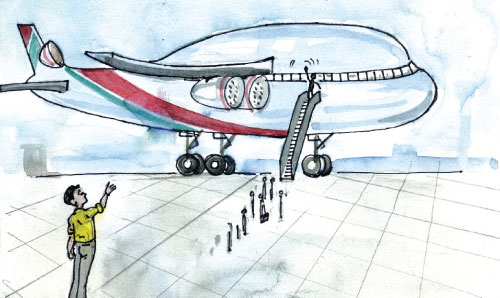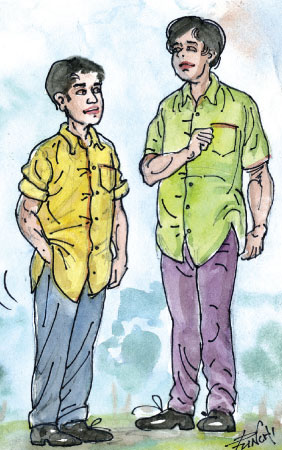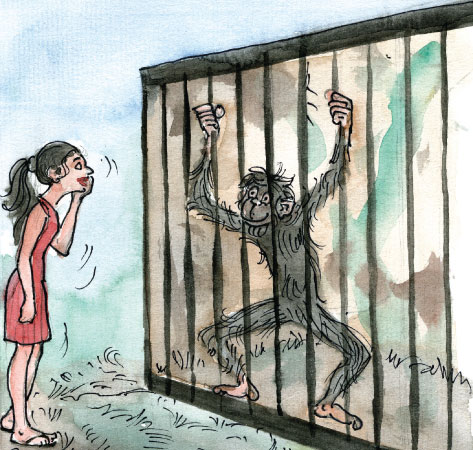|

by R. S. Karunaratne
The use of comparatives
We use comparatives to compare people and things with other people
and things.
New York is bigger than Colombo.
 |
|
He is going abroad for
further studies. |
Amanda is taller than Rohini.
Shan is a more careful driver than Sam.
Sri Lankans are friendlier than Indians.
My grandfather is older than your father.
Ice hockey is more dangerous than tennis.
His new motorcycle is faster than his old one.
Annie is more intelligent than Dawn.
The library is quieter than the classroom.
Russia is bigger than China
Francis and Diana are older than Emma.
The sun is brighter than the moon, but the moon is smaller than the
sun.
Alaska is larger than all the other US States.
Than I or Than me?
Sometimes learners are not sure whether to use "than I" or "than me".
However, the rules are very clear.
Jagath is more intelligent than I am.
Rex is taller than you are.
You are taller than I am.
They are richer than I am.
He is poorer than I am.
In informal spoken English, however, we usually prefer "than me, than
you, than him, than her, than it, than us" and "than them."
You are taller than me.
She is more intelligent than him.
Sam is shorter than Bill.
He is richer than me.
They are more powerful than us.
We are more active then them.
We can use "a lot, a bit, much" or "a little" before comparatives.
Mother's cooking is much better than my sister's.
Titanic is a lot more interesting than Dr Zivago.
You seem to be a bit happier today than yesterday.
 |
|
Sam is shorter than Bill |
Ice cream is a bit sweeter than yoghurt.
He is a little more diplomatic than his predecessor.
We use "more than" or "less than" without adjectives.
Elizabeth spends more than her sister.
You need less than 10 minutes to do this job.
A minute is more than a second.
A second is less than a minute.
A month is more than a week.
A week is less than a month.
A fortnight is more than a week.
A week is less than a fortnight.
Older / elder
We use "older" for people and things.
I am older than your sister.
My house is older than yours.
We use 'elder' for people only.
Have you met my elder brother?
This is my elder sister.
Note: "Elder" is mainly used for comparisons within a family. It
implies seniority than age. When referring to people outside the family,
use "older."
My neighbour is older than I am.
Although "elder" is the comparative form of "old", it is not followed
by "than." Therefore, we say "elder brother" or elder sister."
Farther / Further
"Farther" and "further" are comparative forms of "far." They can be
used to denote distance.
Colombo is farther / further than Mount Lavinia.
New York is farther / further than Delhi.
"Further" has its own uses.
Further supplies of onions will soon be available.
He is going abroad for further studies.
Police are making further inquiries.
There will be a further delay of one month to release the results.
Trade unions are making further demands.
I need further information about this matter.
Match words and meanings
Here's an exciting way to enrich your vocabulary. Match the words in
column "A" with their meanings in column "B" and check your answers with
the key. The first has been done for you.
[Column A]
S 1. displace
... 2. display
... 3. displease
... 4. dispossess
... 5. disproportionate
... 6. disprove
... 7. disputable
... 8. dispute
... 9. disquiet
...10. disquisition
...11. disrepair
...12. disreputable
...13. disrespect
...14. dissatisfied
...15. dissect
...16. dissemble
...17. disseminate
...18. dissension
...19. dissent
...20. dissertation
...21. disservice
...22. dissident
...23. dissimilar
...24. dissipate
...25. dissociate
[Column B]
A. to arrange something so that they can be seen by the public
B. to cut open something and study its structure
C. an action which harms something or someone
D. gradually disappear or waste
E. to consider as separate and not related
F. different
G. a person who publicly disagrees with their government
H. not certain
I. a long piece of writing on a particular subject
J. not pleased with something
K. strong difference of opinion
L. to take property away from someone
M. to spread something
N. arguments and disagreement
O. to hide your real feelings
P. worry
Q. lack of respect
R. a long and detailed explanation of a particular subject
S. to force something out of its usual position
T. an argument or disagreement
U. not trusted or respected
V. to prove that something is not true
W. the state of being broken
X. to cause someone to be unhappy
Y. too large or too small in comparison to something else
Key:
2. A 3. X 4. L 5. Y 6. V 7. H 8. T 9. P 10. R 11. W 12. U 13. Q 14. J
15. B 16. O 17. M 18. N 19. K 20. I 21. C 22. G 23. F 24. D 25. E
Starters:
Adverbs of degree
An adverb of degree makes the meaning stronger or weaker. The degree
of strength or weakness can be small, medium or large.
Small degree
She arrived for the function a little late.
 |
|
Most animals in the zoo suffer
terribly. |
The current situation is slightly complicated.
Medium degree
This is pretty good for the purpose.
His behaviour is fairly unusual.
Large degree
I'm absolutely sure of my success.
He is completely mad.
This room is extremely cold.
An adverb of degree goes before an adjective or an adverb.
It's very warm today.
Amanda looked rather surprised.
Your painting is absolutely beautiful.
Happy times pass quite quickly.
Our team played extremely well.
Before a comparative we can use "a bit, a little, a lot, far, much,
rather" and "slightly."
The patient is feeling a bit better today.
Today the train goes much faster.
Try to work a little harder.
She looks a lot prettier now.
Travelling by train is far better than cycling.
This novel is rather more interesting than the other.
My financial situation is slightly better now.
Some adverbs of degree describe a verb. They go in mid-position.
My tooth is really aching.
Grandfather quite enjoys slight-seeing.
Some adverbs of degree go at the end of a sentence.
Some foreigners travel a lot.
Can you open the window a little?
Most animals in the zoo suffer terribly.
I lost my way completely.
I disagree with you totally.
Much
In a positive statement we can use "very much."
I like her very much. (This is more natural than saying, "I liker her
much.")
In a negative statement we can use either "very much" or "much."
I don't like her very much.
I don't like her much.
[Activity]
Rewrite the following sentences putting in "very, quite" or "a bit"
in the right place. Check your answers with the key.
1. The trains are not frequent in certain parts of the country.
...........................................
2. The musical evening was noisy.
...........................................
3. The weather was good.
...........................................
4. The train was late.
...........................................
5. I didn't buy the new house because it was expensive.
...........................................
6. He looked worried.
...........................................
7. Grandfather walks slowly.
...........................................
8. I came early for the function.
...........................................
9. Your answer is right.
...........................................
10. She walked in a dignified manner.
............................................
Key:
1. The trains are not quite frequent in certain parts of the country.
2. The musical evening was quite noisy.
3. The weather was very good.
4. The train was a bit late.
5. I didn't buy the new house because it was quite expensive.
6. He looked a bit worried.
7. Grandfather walks very slowly.
8. I came a bit early for the function.
9. Your answer is quite right.
10. She walked in a very dignified manner.
Quiz on idioms
An idiom is a special kind of phrase. It is a group of words which
have a different meaning when used together from the one it would have
if the meaning of each word were taken individually. Tick the meaning of
the idioms and check your answers with the key.
1. If you refer to someone as a rough diamond ...
(a) you admire them for their good qualities although they are not
very sophisticated
(b) you do not admire them because of their bad qualities
(c) you avoid them because of their uncivilised manners
2. If the dice are loaded against you ...
(a) everything seems to work in an unexpected way
(b) everything seems to work to your advantage
(c) everything seems to work to your disadvantage
3. If the die is cast ...
(a) you are willing to change your decision
(b) you have made an important decision about the future and you are not
willing to change it
(c) you do not know what to do
4. If things are a dime a dozen ...
(a) there are a lot of them
(b) there is a shortage
(c) they are cheap
5. If someone has done the dirty on you ...
(a) they have scolded you
(b) they have praised you
(c) they have betrayed you
6. If someone is washing their dirty linen in public ...
(a) they talk about pleasant things in public
(b) they wash their clothes in public
(c) they are talking about unpleasant personal matters in front of other
people
7. If you go the full distance ...
(a) you complete what you are doing
(b) you fail to complete what you are doing
(c) you walk to the end of the road
8. If someone is within striking distance ...
(a) they are far away from you
(b) they are very close to you
(c) they do not know you
9. A last ditch attempt is ...
(a) the only way to reconciliation
(b) the only way to make friends
(c) the only way to avoid disaster
10. If a ruler follows a policy of divide and rule ...
(a) they make sure that the people quarrel among themselves and
cannot unite
(b) they make sure that people will unite
(c) they make sure that national wealth is equally divided among the
people
Key:
1. (a) 2. (c) 3. (b) 4. (a) 5. (c) 6. (c) 7. (a) 8. (b) 9. (c) 10.
(a) |

